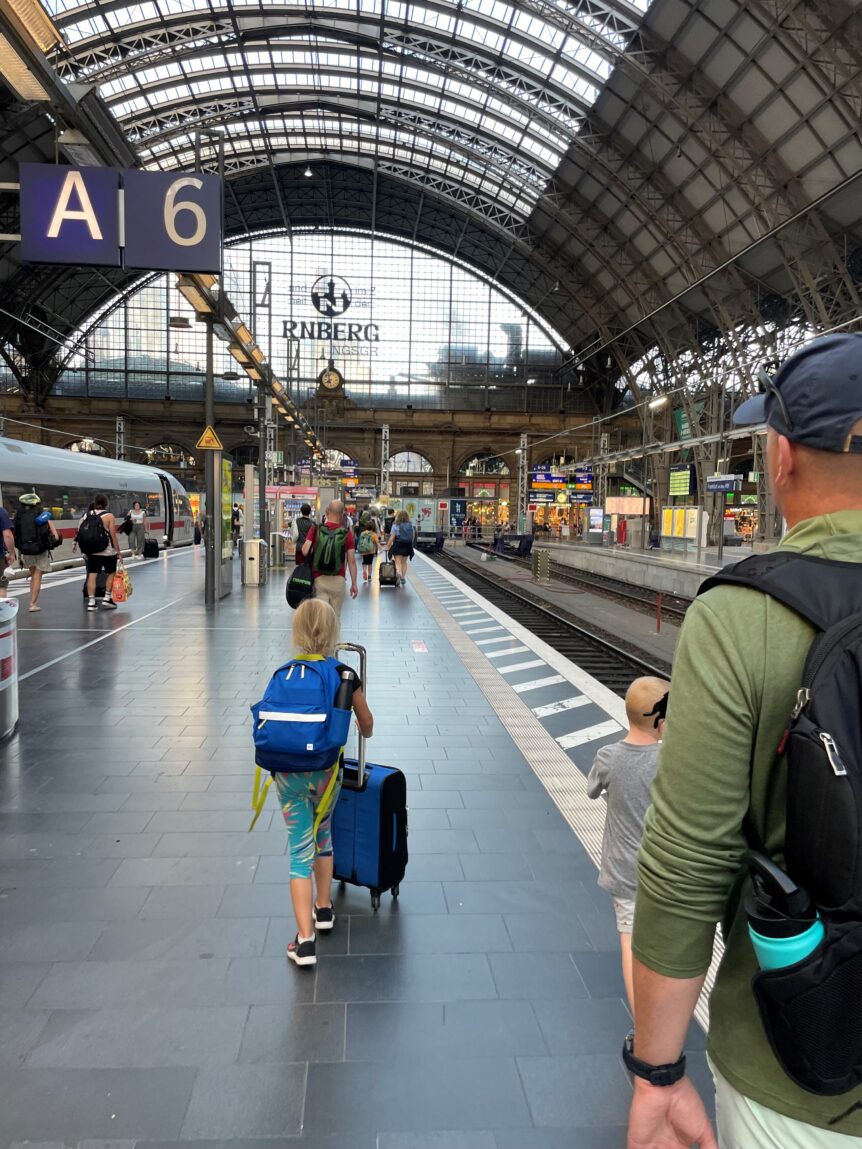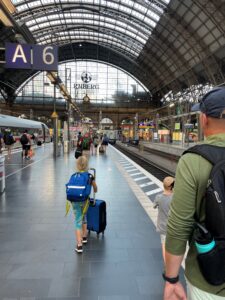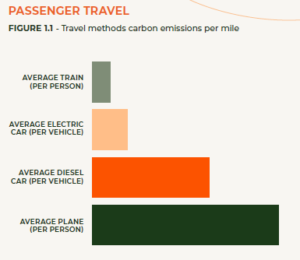
Blog #14 Hail the Rail: How going slow can fast track carbon reductions.

One of the event tourism industry’s biggest strengths is its impact on attendees. One of its biggest weaknesses, though, is the impact it has on the environment.
Event:decision’s State of Sustainability 2023 found that the events they tracked had an average carbon footprint of 117 tons of carbon dioxide equivalent. While this number might shock some event professionals into making their next conference plastic-free, vegan-food-only, locally sourced notebooks affair, that approach isn’t necessarily the most effective.
It can be tricky to know where to start, which is something I found when I hosted a Carbon Instinct workshop for Meetings Professionals International (MPI), a group of event producers. If there’s one thing event producers have an instinct for, it’s cost, but if we’re going to create a positive impact, we need professionals with that same instinctual knowledge of the biggest carbon culprits.
The best place to start? Before the event even begins.
Event:decision’s study found that a whopping 78% of an event’s carbon footprint comes from travel. Research also shows that business travel accounts for 15-20% of a business’s total emissions. Thus, it makes sense for event providers and corporations to tackle their travel.
In my carbon instinct workshop, I showed stats demonstrating that the carbon emissions per person travelling are by far the lowest when taking the train. This came from Isla’s Temperature Check Report

In my ideal world, we’d all give up short-haul business flights and instead take high-speed, comfortable electric trains that get us to our events on time. I am fully “hail the rail.”
But right now, avoiding short-haul flights for work meant I took a twelve-hour bus trip from Edmonton to Lethbridge. It included a stopover in Calgary and an allowance for the year’s first snowstorm. On the bright side, I did get a lot of work done that day! There isn’t a train network here in Canada, and it’s the same in many other places.
While we can’t change the infrastructure situation, we can change how we structure our events so that they no longer force delegates to travel fast and dirty, even if other options exist.
So, how do we do this? We need to make slow travel to and from events not just possible but also valuable.
The easiest thing to change is the time of the event. If a conference or seminar runs from 9 to 5, delegates often have no option but to take an early flight or incur the costs of staying in a hotel the night before and after the event. Indeed, a day train isn’t going to cut it. One solution is that delegates take an overnight train, which means there’s no downtime, and corporations save money on hotels and carbon emissions on flights. It’s an excellent option but one that’s not always possible.
So, what if the event started instead at lunchtime and ran until early afternoon the next day? With this schedule, delegates might be able to take long-haul or local trains to and from the event, and corporations could save by paying for just one night in a hotel instead of two.
As an event host, the next thing to consider is adding travel days on either side of the schedule. All this is then baked in when delegates consider attending, allowing them the freedom to choose slow travel. This might sound like a hard sell to corporations and delegates alike, but with some creativity, these travel days can become integral to your event.
With the benefit of a comfortable seat and Wi-Fi on the train, the pre-event travel day can be enriched by virtual content. Event hosts can create a new kind of hybrid event, releasing teaser videos, online icebreakers and deep dives into what the in-person sessions will offer. All this means that delegates are engaged, excited, and ready to jump into the in-person event by the time delegates arrive. They know what to expect, have questions and discussion points ready, and have even had time to network with the other attendees.
Then, while delegates travel home by rail, event organizers can make key sessions available as recorded talks or offer a post-event analysis or Q&A session with a few select speakers. In addition, the networking opportunities for delegates travelling on the same train are excellent. Delegates return to their office rested, with a clear inbox, real learnings, and a genuine network. When it comes time to do those vital sales follow-ups with a new prospect, you’re doing so from a place of connection and a better understanding of what you can offer each connection.
But will corporations buy in?
Of course, without corporations changing their mindset, none of this will make a difference. But times are changing, and today, you’ll be hard-pressed to find a company without a sustainability mission. It’s just a matter of understanding the actions that can have the most impact.
Yes, train travel takes longer, and time is money. But on modern trains, delegates can continue their work with little disruption, so technically, there’s even less downtime than air travel. Plus, elbow room to actually type properly.

(Photo Credit: Anastasia Nelen of Unsplash)
To really take carbon reductions seriously, corporations need to be more flexible with the time they give to delegates to attend events. They are going to take longer en route, and they’re going to need longer to be there; all principles of the slow travel movement.
This doesn’t need to be a bad thing, but it does require a mindset change. With an emission-reduction mindset, business travellers aren’t going to be jetting off for a quick meeting across the continent. Instead, corporations and event professionals will need to make more considered decisions that make each event worthy of the time, effort and emissions it creates. With this mindset, each event grows in value, and everyone involved becomes more determined to make every element of it worthwhile.
As event professionals, we have the exciting opportunity to make a huge difference by switching our mindset and creating sustainable, regenerative events. We must demonstrate that creating sustainable events is possible; it’s valuable, and it can be instinctual even if it takes a while.
For all the info on sustainable progress in the UK event industry, you can download the ISLA Temperature Check here.
If you’d like to chat more about this topic, want to share your own successes, or have me give a carbon instinct workshop to your organization, I’d love to hear from you!

